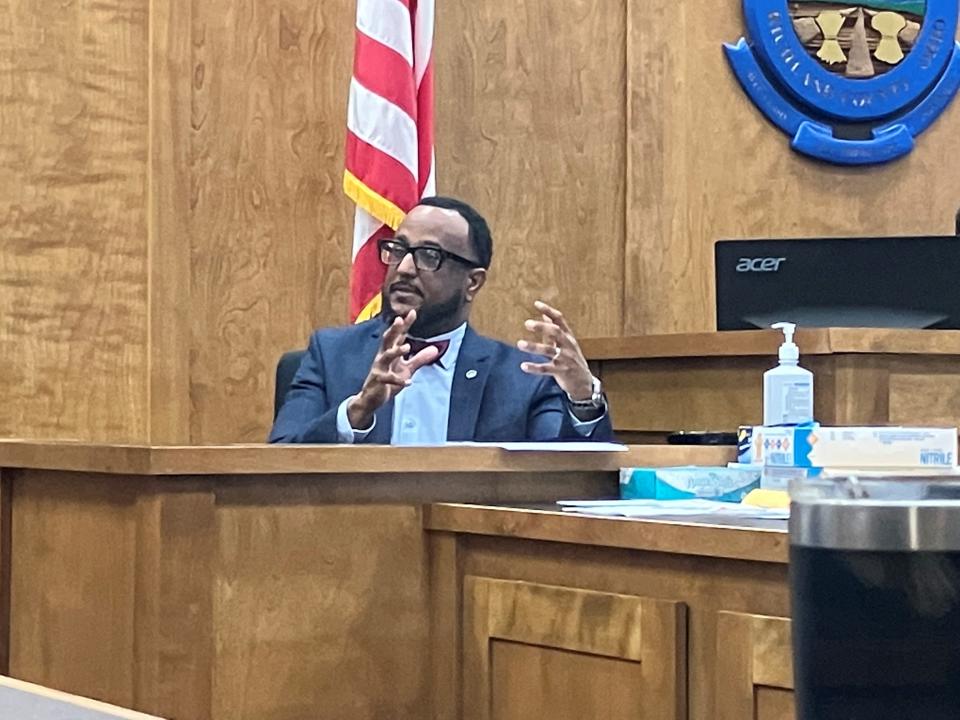Cooper trial: Expert witness says Rios died of asphyxia
Alexander Rios died of asphyxia caused by compression of his torso and neck, not by excited delirium, an expert witness testified Friday.
Dr. Roger Mitchell Jr. took the stand in Richland County Common Pleas Court on the fourth day of the trial of former county jailer Mark Cooper.
Cooper, 56, is charged with two counts of involuntary manslaughter, one a first-degree felony, the other a third-degree felony; and reckless homicide, a third-degree felony.

His charges are in connection with the death of Rios, 28, following an altercation with several corrections officers that happened on Sept. 19, 2019. Rios was there on a felony warrant.
Rios was taken to OhioHealth Mansfield Hospital, but he never regained consciousness. His family took him off life support eight days later.
The official cause of death was excited delirium, which is no longer recognized by many medical organizations.
In the jail video, several corrections officers can be seen holding Rios down, stepping and kneeling on his back while an officer punches his head into the concrete floor and they struggle to handcuff him.
Witness was forensic pathologist based in Washington, D.C.
Mitchell is a forensic pathologist who serves as the chief medical examiner of the nation’s capital. He is also a professor at Howard University in Washington, D.C.
Mitchell recently had a book published about people who die in police custody. He said he has performed 25-30 autopsies on such people.
On cross-examination, defense attorney James Mayer III questioned Mitchell about being paid for his services and his advocacy regarding people who die in custody.
Special Prosecutor Forrest Thompson had Mitchell review jail video of the incident.
"We don't see video like this in forensic medicine that shows when a person loses their life," Mitchell said.
Thompson played the video for Mitchell, stopping it periodically to ask the doctor for his opinions.
At the 2:27 mark, Mitchell said of Rios, "He's becoming labored at that point. You can tell he's having trouble breathing."
At the 2:51 mark, Mitchell notes an individual (Cooper) was standing on Rios' back with one foot off the ground.
"You can hear him trying to push air past," Mitchell said of Rios. "He cannot push air past the force that's being applied to his back."

More than 3½ minutes in, Mitchell said Rios was turning blue, noting Cooper's foot was still on the back and neck.
At the 3:56 mark, Mitchell said the officer took his foot off Rios and "came down on him with his knee."
The forensic pathologist said he did "not see the officer letting up."
Rios turned 'blue' 5 minutes into confrontation
At 5:03, corrections officers were lifting Rios. He was blue and showed no response.
Mitchell also discounted excited delirium, which was listed as the cause of death by the Montgomery County Coroner's Office, which performed the autopsy.
"For a long period of time, excited delirium has been in the literature as an explanation of sudden death," Mitchell said. "Now several, if not all medical organizations, dispute it as a cause of death. It's not to be used."
Mitchell said excited delirium often was used to categorize deaths where there weren't many visible injuries.
"It's clear that these deaths are not excited delirium, if they ever were," he said.
Mitchell said he had never seen a case involving someone standing on a person with full body weight.
"If it had been brief, would that have been life-threatening?" Thompson asked.
"No," Mitchell replied.
The special prosecutor asked him what changed to make the situation turn deadly.
"Another person standing on the back of Mr. Rios," Mitchell said. "If you can't move your chest to breathe, you can't breathe."
Dr. Lee Lehman, a deputy coroner with the Montgomery County Coroner's Office, oversaw the autopsy and previously testified he believed excited delirium was the cause of death.
He speculated that Rios was under the influence of methamphetamines, though he did not test positive for the drug. A urine screen at the hospital revealed amphetamines in his system.
Mitchell said meth tends to make a person's heart race, but he said Rios' heart slowed because he wasn't getting enough oxygen.
"Even if he had meth, I wouldn't have diagnosed him with an overdose because of what we saw on the video," Mitchell said.
Expert witness paid for his services
On cross, Mayer asked Mitchell about his firm, Ram Consulting. The witness said he is paid $500 an hour for his services.
On a podcast, Mitchell talked about his concern that no police officers went to prison after firing 41 shots at an unarmed man in New York City several years ago.
Mayer asked Mitchell if he is an activist. Mitchell replied he considers himself an advocate.
In his book, Mitchell said any physical altercation that leads to death should be ruled a homicide. He admitted on the stand that not all medical examiners agree with his stance.
The defense attorney also asked Mitchell if he reviewed three other videos of the incident in question that were captured by cameras at the county jail.
Mitchell said he did not review them, only the handheld video recorded by a corrections officer.
Mayer asked Mitchell about Rios' discharge diagnosis from the hospital, which said he experienced cardiac arrest. One of the possible causes is substance abuse.
Rios' mother told hospital staff that he had relapsed three or four weeks before his death and had dealt with addiction issues for years.
Richland County coroner testifies
After 3½ hours on the witness stand, Mitchell was followed by Dr. Daniel Burwell, Richland County coroner.
He told Assistant Prosecutor Scott Salisbury that he almost always agreed with findings of the Montgomery County Coroner's Office, calling them the "gold standard."
Burwell, who has been coroner since 2017, said he had disagreed with Montgomery County only a couple of times.
Like Lehman, Burwell said he thought Rios was experiencing drug-induced delirium based on the way he was acting.
"It's my opinion he was on methamphetamines. I think it's pretty obvious in the video," Burwell said.
mcaudill@gannett.com
419-521-7219
X (formerly Twitter): @MarkCau32059251
This article originally appeared on Mansfield News Journal: Forensic pathologist: Death in Richland County Jail was asphyxia

